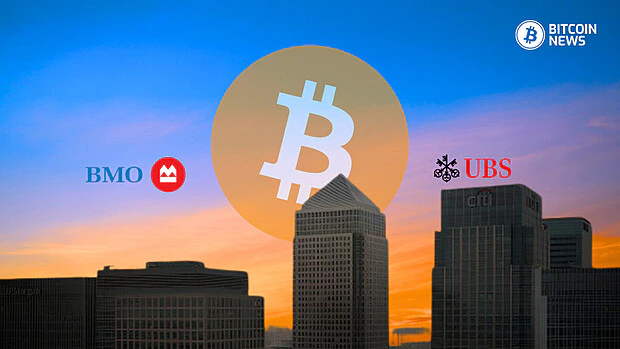In a significant move, major global banks are embracing Bitcoin Exchange-Traded Funds (ETFs), marking a notable shift in traditional finance towards digital assets.
Canada’s Bank of Montreal (BMO) and Swiss banking giant UBS have emerged as frontrunners in this new trend. Both banks have disclosed their holdings in Bitcoin spot ETFs, signaling a strategic move towards integrating bitcoin into traditional financial portfolios.
According to recent Securities and Exchange Commission (SEC) filings, BMO controls over $1 trillion in spot Bitcoin ETF exposure.
This includes holdings in Fidelity (FBTC) with 9,778 shares worth $540,332, Franklin Templeton (EZBC) with 8,795 shares worth $322,336, BlackRock (IBIT) with 133,609 shares worth $4,809,924, and Grayscale (GBTC) with 10,595 shares worth $636,154, totaling over $6 million.
Similarly, UBS disclosed its investment in BlackRock’s iShares Bitcoin Trust (IBIT), holding 3,600 shares with a total value of only $146,000. UBS’s decision to invest in Bitcoin ETFs marks a notable shift for the Swiss banking giant, considering its previous skepticism towards digital assets.
Interestingly, on January 25, 2024, two weeks after the ETFs were given the green light, UBS’s Chief Investment Office penned a note, stating “the fundamental investment case for crypto assets broadly remains weak”.
In 2018, the Bank of Montreal even prevented some of its clients from investing in Bitcoin. A user on X noted the banks change in stance toward Bitcoin stating:
“The Bank of Montreal, who made it very, very difficult to move my money out of their Bank to buy my Bitcoin (and even went so far as to have a senior account manager call me to warn me off), has also bought its own Bitcoin!”
Another noteworthy participant in the race for added Bitcoin ETF exposure is BNP Paribas, Europe’s second-largest bank, with $600 billion in assets. In a recent 13F filing, it disclosed purchasing 1,030 IBIT shares valued at $41,684, marking its initial foray into the sector, albeit with a smaller investment sizer relative to UBS.
The decision by Bank of Montreal and UBS to invest in Bitcoin ETFs reflects a broader acceptance of digital assets within the traditional financial sector. The endorsement propelled the product to become one of the top-performing ETFs in Canada’s history.
Bitcoin ETFs offer investors a regulated and secure way to gain exposure to the digital asset market without the complexities of directly purchasing and storing bitcoin.
Unlike other financial products related to Bitcoin, ETFs involve the actual purchase of bitcoin by the issuer, providing investors with real-time price exposure.
The iShares Bitcoin Trust (IBIT), managed by BlackRock, is one such ETF that has gained traction among institutional investors. With net assets of $16.6 billion as of May 2024, IBIT offers investors a convenient way to access bitcoin within traditional brokerage accounts.
Related: BlackRock Educates Investors on Bitcoin With New Series
Despite concerns about the asset class’s volatility and speculative nature, UBS’s foray into Bitcoin ETFs underscores the growing acceptance of digital assets within the banking sector.
As reported, UBS also appeared on the list of authorized participants for BlackRock’s IBIT, further highlighting its commitment to the emerging asset class.
BlackRock’s significant ownership stake of approximately 5.01% in UBS Group is also notable, showcasing its status as a major institutional shareholder in the Swiss financial powerhouse.
13F Filings: Highlighting Bitcoin Institutional Adoption
All institutions with assets over $100 million are required to submit quarterly reports and filing to the SEC, allowing us to track their ETF’s additions in an open and transparent manner.
These filings reveal a growing number of traditional financial institutions entering the Bitcoin market through Bitcoin ETFs.
The embrace of Bitcoin ETFs by major banks extends beyond UBS and Bank of Montreal. Institutions like BNP Paribas, JPMorgan Chase, and recently Susquehanna International Group have all reported exposure to Bitcoin ETFs, indicating a broader industry trend towards bitcoin adoption.
As more institutional capital flows into Bitcoin ETFs, it could lead to increased liquidity, stability, and mainstream acceptance of the digital asset.










